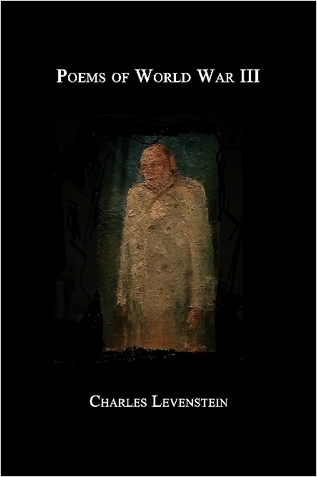|
Jim Doss
Charles Levenstein,
Poems of World War III,
Lulu Press, ISBN 978-1-84728-888-2, 52 pages, 2006, $12.00.

Judging from the cover of Charles Levenstein’s
latest book, which shows a painting of a Big Brotherlike figure dressed
in khaki clothing, or the title, Poems of World War III, it’s hard for
the reader not to expect a book filled with political poetry, or
apocalyptic visions. However, in the preface Levenstein goes to great
pains to claim that he
doesn’t write political poems, but from his “old-man’s consciousness and
life.” Or as Levenstein puts it in his poetry:
Oh Lord, how am I to accept this life of privilege
when Your world of violence and tears,
Your bloody world of Oil and Empire,
requires that I bear witness— at the very least.
And later:
I do not write political poems.
I write kitchen crap and confessions.
This is not about politics.
It’s about our goddam lives.
But a more representative quote that embodies the spirit and tone of the
collection is:
It’s hard to maintain the level of outrage
Warranted, this unending tale
Of imperialism gone amok, money
And power no longer sufficient to explain
Schoolboys with firepower killing and
Killing. The world is sick of this and,
If it is not, I am. Columbine. Kabul.
This is indeed a book of political poetry with unabashed socialist leanings, but there is also a very human element to
it, not just pre-baked ideology and diatribe, and this is what Levenstein refers to in his disclaimer. In the post 9/11
world, it is impossible for a person of conscience to shut their eyes to the atrocities taking place around the world.
They inundate us every day in the newspaper headlines, or on the cable news networks. Whether we’re sitting
comfortably in our living room or sipping coffee in a third-world café, we cannot and should not ignore them.
Levenstein poems are set in such diverse places as Brazil, Bolivia,
Guantanamo Bay, Mexico, Spain, Russia, China, and Boston. He offers us a
global perspective on world events and modern day Empire building, the
absurdity of politicians and the news media, and the greed of
corporations. The poems that are most successful blend politics with
personal history and humor:
What mad Designer did this to us!
Just when I am becoming not-an-asshole,
the innkeeper announces last call!
Oh, Lula, if you had only won on the first round,
I would dance in Bahia,
I would be a child again
with wide eyes and hope for the human race.
Or offer unexpected insights:
I remember the Che poster we displayed— Ridiculous as it might seem, the
true revolutionary is motivated by feelings of love— or something like
that.
The poems that are least successful in this volume remain almost
exclusively in the
political realm. But the reader must remember it is vital for the author to recite the litany
of injustices that have intruded upon his retired life. For
example, in a poem
such as “Occupied Territory,” the reader is bounced between the current
events of the day: the Terry Shiavo feeding ordeal, the war on terrorism,
the latest Michael Jackson trial, the war on terrorism, the impending death
of the pope, the war on terrorism, then the Red Sox-Yankees opening day game.
There are also several poems devoted to the Guantanamo Bay detainee
camp. But when
the personal is mixed with political and juxtaposed across time and
history, Levenstein creates a devastating impact:
When I was a youth my mother hid
The People’s Songbook so I would not
sing commie songs at college and
waste my young life at Leavenworth.
Now I scour my home for middle eastern
treasures, olive wood camels, varnished
sunflower seeds, posters with strange scribbling
might frighten Homeland Security.
I do not say Shalom for fear
they’ll hear Saalam and search my shoes
for bombs or other secret messages.
I worry for the baby boomers
who missed the valuable training
provided by the Red Scare of the 1950’s.
In Poems of World War III, Levenstein
has created a book of extraordinary intelligence and social
consciousness. But more than that, it is a call for fellow
poets and human beings to see the world in its entirety and speak up:
Reading the Three Penny Review #103 last night
I am stunned at the world in which these writers live—
no unrelenting war in Iraq (or Afghanistan),
no threats of assassination by fundamentalist preachers
against the President of Venezuela, no catastrophes
in New Orleans or Houston, not a hint of Americans
killed and killing, no American refugees—
…
Meanwhile, World War III rages on, the ocean heats up a degree
or two. Cancers erupt on those in the sun.
…
I wished I lived in the bubble, I certainly tried…
Whether or not you agree with Levenstein’s political point of view, this
book is worth reading and paying attention to. He has gone places most
poets fear to tread or don't have the talent to turn into poetry.
© Jim Doss
|

